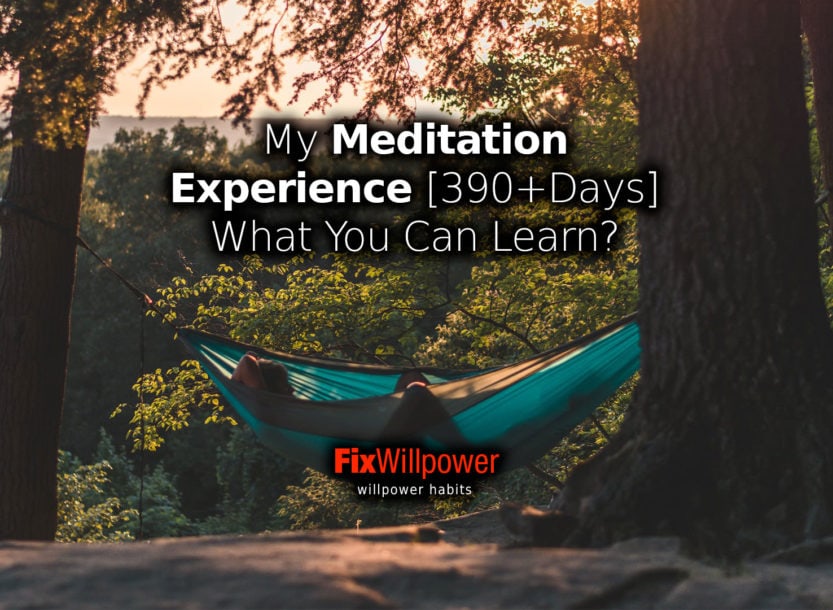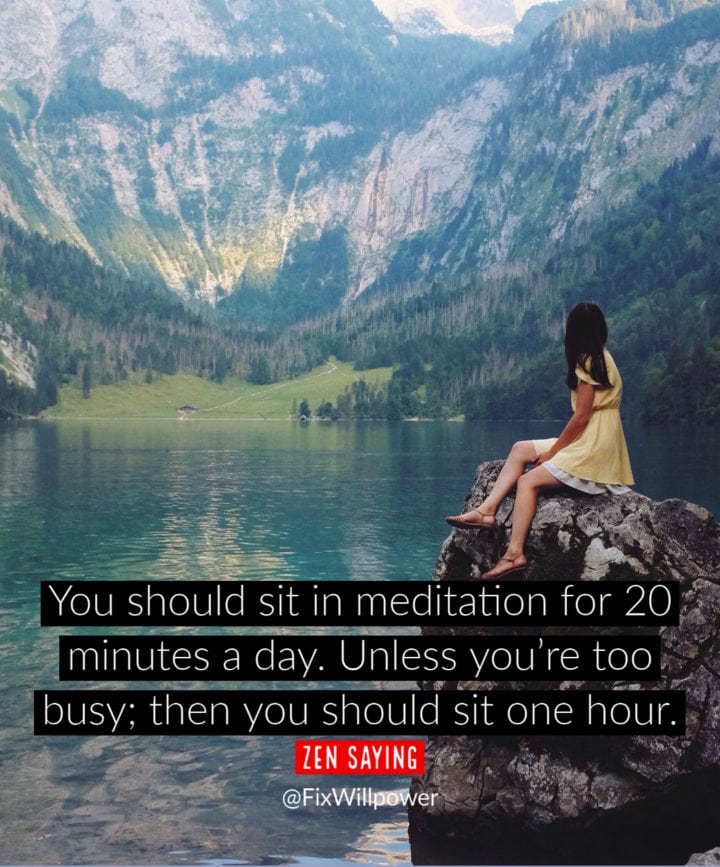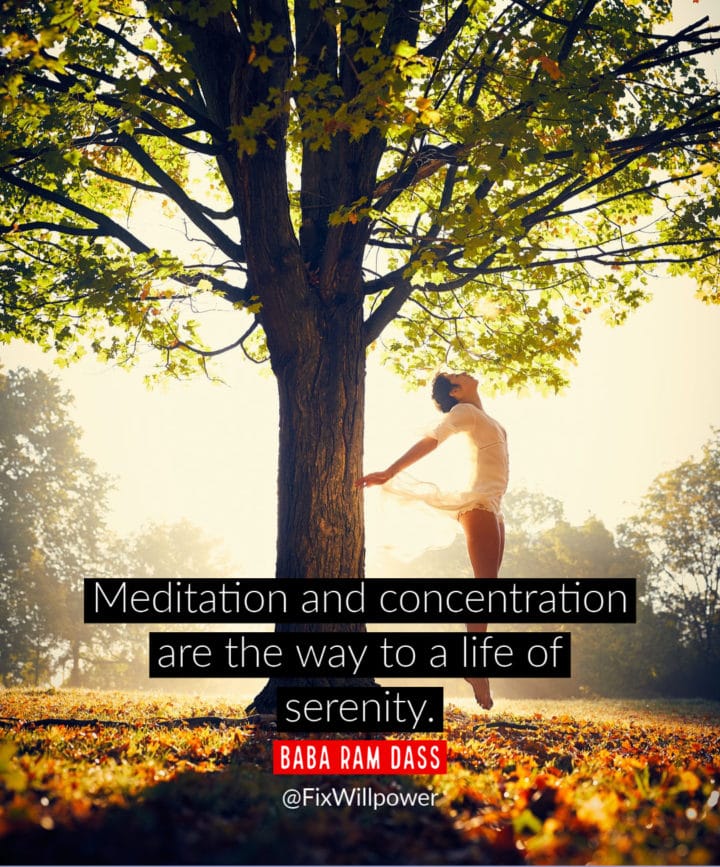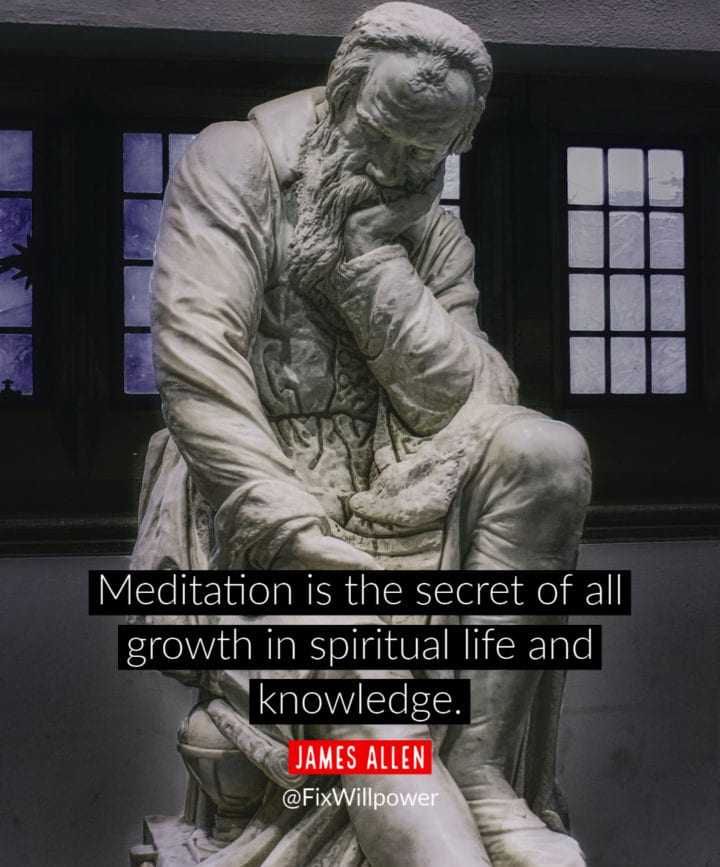My meditation experience started with the need to become calmer.
I needed to get a lid on my emotions.
Short fuse has brought me more problems than I care to count.

One of the main benefits that I’ve got from meditation is that I can change my thought at will at any point. When I start to ruminate on something unhelpful, I can make a conscious decision to think about something else. Really useful!!
Key Points of My Meditation Experience
- Managing Emotions and Reactivity: Meditation can significantly improve emotional regulation and reduce reactivity. The practice helps create a pause between stimulus and response, allowing for more thoughtful reactions instead of impulsive ones.
Next: Start with short, manageable meditation sessions to gradually build the habit. - Establishing a Meditation Routine: Consistency is key in meditation. Begin with a 5-minute session and incrementally increase the duration. A relaxed, comfortable position is essential to maintain focus without physical discomfort.
Next: Start a daily meditation routine. Gradually increase your session duration to build a sustainable practice without overwhelming yourself. - Breathing and Focus Techniques: Initial focus on breathing can help settle the mind. As you progress, aim for silent meditation to deepen your practice. External focal points, like a red dot on the wall, can aid in maintaining concentration.
Next: Start with guided meditation or breathing exercises if complete silence is challenging. - Adapting to External Distractions: Meditation can be practiced with eyes open or closed, depending on the environment. Noise-canceling headphones or white noise can help mitigate auditory distractions, creating a more conducive environment for meditation.
Next: Experiment with different environments and techniques to find what works best for you. Use tools like headphones or white noise apps to minimize distractions and enhance focus. - Tracking Progress and Benefits: While subjective improvements in calmness and emotional stability are common, objective measurement can be challenging. Regular meditation contributes to a general sense of well-being and happiness, making it a worthwhile practice. Next: Reflect on your progress periodically, noting changes in your emotional responses and overall well-being.
I react before I think. Some people say you should count to 10 before you say or do something. I have never got that idea. I could never catch myself before the explosion. I can count to 10, but later.
I understood I had a problem, but I had no clue what to do about it. Through popular science and self-help books, I somehow drifted to meditation.
On the surface, mediation seems like a futile exercise. But many credible sources showed that meditation should help with self-control and willpower. So, I decided to get the meditation experience.
In one study, during cognitive-behavioral therapy (CBT), mindfulness increased from a mean of 1.96 at baseline to 2.11 by session 25. Concurrently, depression scores decreased from 26.08 to 16.19, and anxiety scores decreased from 18.54 to 13.88. These results demonstrate the significant impact of mindfulness on reducing symptoms of depression and anxiety over the course of therapy. CBT can also help with ADHD symptoms.
I’m fairly good at grinding. I decided to meditate for 30 days.
Here’s how you stick to the meditation habit
I found that what works for me is not skipping even a single day.
This seems impossible? Not really!
Most of my meditation sessions are 20 minutes, but when you are ready to go to bed and remember, “Oh, crap, I forgot to meditate today!” then you just do it just there. Even if it is just 1 minute. Or as one guy put it, “Just meditate for 3 breaths.” This will make your brain stick to the habit and make it automatic.
Meditation experience day 1
On the first day, I sat down on the couch and stared at the wall for 5 minutes. For whatever reason, I felt that 20-minute meditation sessions would be a good thing. The idea was to add one minute to the meditation session every day. Then in two weeks I would meditate 20 minutes every time until the end of the 30-day meditation challenge.

You should sit in meditation for 20 minutes a day. Unless you’re too busy; then you should sit one hour. ~ Zen Saying
Meditating position
Right from the beginning, I dismissed the idea of sitting in an awkward position for meditation. I figured that focusing on my thoughts would be hard enough without focusing on my body.
I’m quite sure a relaxed and comfortable posture is best for your meditation experience. However, I get it that when you become better at meditating, then adding the posture as an additional thing to control and notice would help. It’s like adding weight at the gym when you get stronger.
Don’t put 500 pounds on the bar on day one.
Do it later.
Supernatural was another thing I dropped from my meditation experience. Reincarnation, different planes of existence… I’m saying no at the moment.
Laying down in bed
As I try to time most of my meditation just after I wake up, then I do it in bed, laying down.
The best position for me is flat on my back with limbs slightly apart so they don’t touch each other. It’s a bit like floating in an isolation tank.
Meditation may put a very special impression on your face, very different from sleeping. Sometimes when I do it my wife is next to me. She calls it playing dead.
Breathing and focus
In a day or two, I noticed that it’s hard for me to focus on the blank wall. I found a small red dot and put it on the wall to avoid wandering with my eyes.
From the very start I tried the silent mind meditation. I felt that if I try to silence the chatter in my head with adding a mantra or some other thing to focus on would not make much sense.
Again, the weightlifting example comes in handy. In the beginning, you might need something to focus on. Breath in, breath out… And I did it. I figured I will focus less on breathing as I progress through my challenge.
Breathing itself became a distraction. It’s interesting to notice your breathing as something distracting your complete silence of thought. I felt that breathing becomes something you have to consciously do and think about.
In the beginning I used the in, out, in, out, mantra. Somehow it didn’t seem right. If the goal is cessation of all chatter in your mind, then in-out is a thought.
Now, after almost 400 days of meditation, I have still sometimes focus on breathing, but it has become more of a feeling than a thought.
Falling asleep
I rarely fall asleep while meditating, but it happens.
It’s blindingly obvious, but I will say it, anyway. You will fall asleep when you are tired. It can happen at any time of day. In my meditation experience, I fall asleep in the morning when I didn’t get enough shut eye or in the evening when I’m exhausted.
Meditation is important, so I rarely leave it until just before bedtime. Meditation is hard and doing it after all the energy spent during the day doesn’t seem optimal. For some people, meditation just before bed may help to wind down and get a better sleep.
In the morning I wake without an alarm, but even then, I sometimes wake before I should. If I meditate in this situation, then I might fall asleep again.
During the day, I’m usually so active that I can’t fall asleep even if I want to take a nap. In rare cases when I’m exhausted, I try to time the meditation so I stay awake.
Eyes open or closed
I sometimes meditate with my eyes open and sometimes they are closed. Whenever possible, I try to meditate first thing in the morning. Even before I get out of the bed. Right after waking up it’s easier for me to keep my eyes closed.
If I meditate later in the day, then I meditate eyes open. As I noted above, I usually stare at the wall or some other object in the room.
I don’t have any difference in meditation with eyes open or closed in a calm environment. However, it there’s movement in your field of vision then it would be better to meditate with your eyes closed. For example, on the airplane or sitting in a reception room.
If you feel that sitting in a public place with your eyes closed is weird, then you can leave your eyes open. Consider the distracting movements as an extra tough workout for your mind.
Sounds in the environment

Alternatively, there could be noise, indistinct sounds from the street or people talking so you can’t make out the words. These sounds are usually OK. The distinct sounds you can focus on are the true distractions.
I said you can’t close your ears, but you can block the sounds. The best option would be noise canceling headphones. I use Sony 1000XM2 headphones. I’m a big fan of this tech and will get myself new ones as soon as the 1000XM4 model comes out.
Before I had noise canceling headphones, I played white noise in regular headphones. There are apps and websites that let you choose what type of noise you like and play your favorite kind for as long as you need. I even used noise for the entire day when working in a distracting office.

Meditation and concentration are the way to a life of serenity. ~ Baba Ram Dass
Guided meditation
When I started meditating, I was doing a lot of research about the topic. This led me to guided meditation. So, I figured I’ll give it a go.
Guided meditation is much easier than trying to focus on silence on your own.
So, I stopped doing it.
Why?
I think guided meditation is like listening to a radio or a podcast. Sure, it may be less intense and direct you to focus on your body and mind, but it’s still chatter. You should definitely do it in the beginning. Later, as you get better and more in control of your mind, I would suggest moving on to silence.
Guided meditation helped me focus better by noticing when I slip into my thoughts. When you are listening to your guide, it’s easier to catch yourself not listening as you start your internal self-talk.
Some notes about my meditation experience
You should probably get a live human coach. A mentor of sorts would let you discuss your experiences and make faster progress.
Willingness is a technique where you accept the shortcomings and observe yourself from a distance as a third person. This helps you become calmer and understand what’s going on in your head. Looking at yourself as a third person also lets you have a more objective view of the situation.
Mindfulness escaped me for a long time. I think I’m getting better, but I’m still confused. What comes first? Do you have to be mindful for meditation, or should you meditate to become mindful? I think mindfulness is the more active form of meditation that you can weave into your daily life. Notice what’s happening around you, what are you feeling, and how you react to it.
For example, about the same time I started meditating regularly, I also started a no swearing challenge. To avoid swearing, you have to be mindful of how you speak. The rules of the challenge meant that I had to give 5 euros to anyone who pointed out to me I was using foul language. In the beginning, I paid out dozens of dollars every day. Then I became more mindful until I didn’t use strong words anymore.
Then I changed the rules so that when I caught myself thinking in strong words, I put 5 euros in a swear jar. Now, I don’t even think in words that could be considered swearing.
In total, it took me about half a year to get to this point. I think meditation and mindfulness were a big part of achieving the result. However, the challenge also helped to improve mindfulness and meditation.
Calmness. Becoming a calmer, less reactive person is one goal for my meditation exercise. As Zen-people say, don’t react, respond. With my meditation experience, I feel I have become calmer and less explosive over the last year. I still explode more often than I would like, but I think I have made progress.
I didn’t think about measuring the initial situation, so I don’t know if objectively I have become calmer. I hope I have.
Smiling. Sometimes I put a big smile on my face when I meditate. Some research shows you will become happier just forcing the smile on your face. So, I figured why not try it while meditating. I’m not rigorous about smiling, but every now and then I remember to do it. I don’t know if it has any positive effect, but I think it wouldn’t hurt either.
Tensing up during the meditation session. Sometimes I notice that my legs or shoulders have become rigid during my meditation session. Similar to the tension you might have when intently focusing on something. I just notice it and go back to being limp. This is where laying down helps as you can be totally relaxed in all muscle groups.
In a study Effects of combining meditation techniques on short-term memory, attention, and affect in healthy college students, researchers found improved cognition, especially attention, short-term memory, and affect in terms of positivity and reduced negativity.

Meditation is the secret of all growth in spiritual life and knowledge. ~ James Allen
Results
What results? When I started, I didn’t take measurements.
What is there to measure?
Also, scientific studies with one participant are not the gold standard I would really trust.
There’s no blind, randomly controlled B test for my meditation experience.
Subjectively I feel that I’m calmer now and maybe a bit less of a jerk, but I can’t prove it.
The main thing that bugs me is the 120 hours of time that goes into meditating 20 minutes every day for a year. It’s amazing how much stuff you could get done in 120 hours. Now, I just sit there and do nothing.
Still, I will continue to meditate and experiment with various ways of doing it.
Meditation makes me feel subjectively happier.
That’s all you can ask for.
Mindfulness Meditation Improves Attention
A study found that a 10-minute meditation session improved accuracy on incongruent trials in a Flanker task, with participants in the meditation group achieving 95% accuracy compared to 91% in the control group. In another study using the Attention Network Test (ANT), those who meditated responded faster, with reaction times averaging 529 milliseconds versus 566 milliseconds for the control group.
2022 meta-analysis reported that mindfulness had the best long-term maintenance of any non-drug treatment for ADHD, meaning participants continued to benefit months after the training ended.
There’s some evidence that meditation may help with chronic lower back pain.
What studies say about meditation effectiveness?
In a study Brief meditation training can improve perceived stress and negative mood they found that all 4 outcome measures improved significantly after instruction (Profile of Mood States; Perceived Stress Scale; State-Trait Anxiety Inventory (STAI); and Brief Symptom Inventory (BSI)). The reductions from baseline ranged from 14% (STAI) to 36% (BSI). More frequent practice was associated with better outcome. Higher baseline neuroticism scores were associated with greater improvement.
Meditation quotes
Your goal is not to battle with the mind, but to witness the mind. ~ Swami Muktananda
Rule your mind or it will rule you. ~ Buddha
The thing about meditation is: You become more and more you. ~ David Lynch
______________
Cover image Pexels


![Read more about the article Why You Need to Ask for What You Want [2024]](https://fixwillpower.com/wp-content/uploads/self-improvement-ask-for-what-you-want-429x314.jpg)
![Read more about the article Here’s How to Stop Procrastination Now [VIDEOS]](https://fixwillpower.com/wp-content/uploads/procrastination-429x314.jpg)
![Read more about the article Why You Should Find the Good in a Bad Situation [4 STEPS]](https://fixwillpower.com/wp-content/uploads/interested-surprise-429x314.jpg)